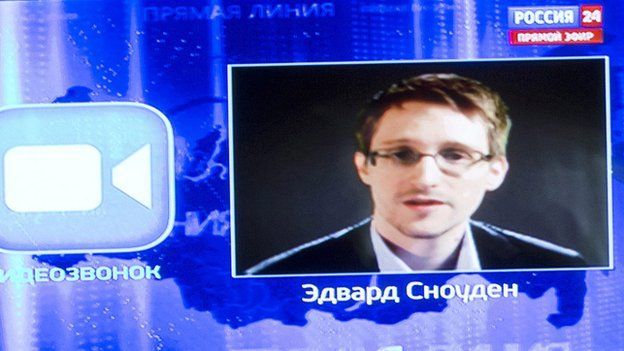Snowden and Putin: Who is playing whom?
- Published
- comments

Is Edward Snowden a Russian propaganda stooge - or crazy like a fox?
The debate over Mr Snowden's actions and motivations was once again joined on Thursday, after the NSA leaker appeared on a Russian television call-in show to ask President Vladimir Putin about his country's surveillance programmes.
In an unannounced video appearance on a town-hall-style forum, Mr Snowden referenced the US "mass surveillance of online communications and the bulk collection of private records by intelligence and law enforcement services", then asked the Russian president:
Does Russia intercept, store or analyse, in any way, the communications of millions of individuals, and do you believe that simply increasing the effectiveness of intelligence or law enforcement investigations can justify placing societies, rather than subjects, under surveillance?
(You can read a full transcript here.)
Mr Putin, an ex-KGB officer, said that since Mr Snowden is a fellow former intelligence agent, he would answer in their "professional language". He then said that, unlike the US, "we don't have a mass system of such interception, and according to our law it cannot exist".
"Our special services, thank God, are strictly controlled by the society and by the law and are regulated by the law," he added.
Mr Snowden's critics were quick to pounce. The Daily Beast's Eli Lake writes that Mr Putin's answer to this "canned question" was an "outrageous lie", citing examples of Russian surveillance during the Sochi Olympics and in Ukraine.
"That statement may be true in a parallel universe," he writes, "where Crimean citizens all on their own with no orchestration from Russia spontaneously voted to join the Russian federation after random mercenaries with no ties to Moscow seized its airports and government buildings."
He quotes New York University's Mark Galeotti, who says Mr Snowden is now "bought and paid for entirely by the Russians. The Russians are not altruistic, if they are protecting him they are doing so because there are things he can do to repay them".
Wonkette's Alex Ruthrauff thinks that, at best, Mr Snowden is being a naive idealist who didn't know how he would be used once he sought asylum in Russia. At worst, he said, he is a traitor who was spying for Russia all along and is now willingly being used to promote a Russian agenda.
On Friday, on the opinion pages of the Guardian, Mr Snowden responded to the attacks.
First, he says there was a strategy behind his choice of words:
The question was intended to mirror the now infamous exchange in US Senate intelligence committee hearings between Senator Ron Wyden and the director of national intelligence, James Clapper, about whether the NSA collected records on millions of Americans, and to invite either an important concession or a clear evasion.
He then takes issue with how his question was received by some in the West:
I was surprised that people who witnessed me risk my life to expose the surveillance practices of my own country could not believe that I might also criticise the surveillance policies of Russia, a country to which I have sworn no allegiance, without ulterior motive.
And explains his objectives:
I expected that some would object to my participation in an annual forum that is largely comprised of softball questions to a leader unaccustomed to being challenged. But to me, the rare opportunity to lift a taboo on discussion of state surveillance before an audience that primarily views state media outweighed that risk. Moreover, I hoped that Putin's answer - whatever it was - would provide opportunities for serious journalists and civil society to push the discussion further.
"If we are to test the truth of officials' claims," he closes, "we must first give them an opportunity to make those claims."
Mr Snowden's supporters rallied to his side.
Glenn Greenwald, one of the first journalists to publish Mr Snowden's information on NSA surveillance programmes, tweeted: "Writing an op-ed criticising Putin's response while needing asylum is as brave an act as the initial whistleblowing & shows same integrity."
In the past, Greenwald has argued that the US has gone out of its way to prevent Mr Snowden from seeking asylum in countries less controversial than Russia in order to more easily "demonise" him.
"This latest response suggests that Snowden is (once again) playing a game where he's several moves ahead of many folks," writes Techdirt's Mike Masnick.
"Snowden likely made a lot more powerful enemies today - including more who could make life very uncomfortable for him very soon," he says. "But he also showed why the public, around the globe, owes him an incredibly large debt of gratitude, one which it's unclear we'll ever be able to pay off."
The Atlantic's David Frum isn't convinced, however. Mr Snowden's "self-justification", he writes, "only makes things worse".
"Snowden is participating in and lending his support to a massive lie," Frum writes. "Russian journalists will not 'revisit' (as he puts it) the truthfulness of Putin's answers. Russian journalists who do that end up dead, in at least 56 cases since 1992."
"As criticism," he continues, "Snowden's op-ed today occupies a fine place in the history of fellow-traveling toadying."
"Yesterday, Snowden aided Putin in deceiving the Russian people about state surveillance of their communications," he concludes. "Today, he undertook the secondary task of deceiving his supporters in the West about his own stance toward the Russian state. On past performance, that second task will likely be the easier one."
Fox or stooge, Mr Snowden continues to drive debate.
- Published26 March 2014
- Published10 March 2014
- Published7 March 2014